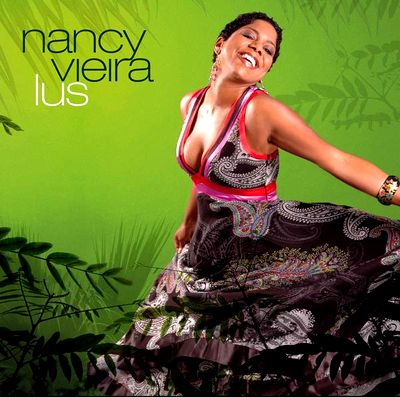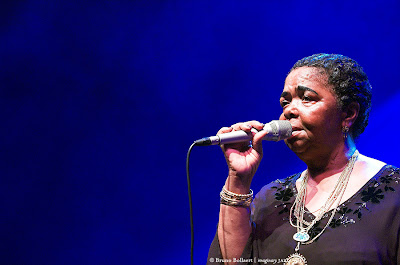Often overlooked and constantly under-appreciated, music in Portuguese is undergoing a remarkable renaissance that is redefining the many genres that it spans. Produced in countries in several different continents and showcasing an astonishing diversity of sound, lyricism, talent, rhythm, and innovation, music in Portuguese is rapidly attracting new listeners and fans across the world, many of which can't even understand the lyrics. Whether its created in Angola, Portugal, Brazil, Mozambique, Cape Verde or, increasingly, in collaborations between artists residing in these different countries, music in Portuguese is a welcome respite from the generic, mass-produced vapid fare clogging our airwaves.
Below are 10 great reasons to listen to music in Portuguese. For the long-time readers of this site, many of the songs, artists and genres are familiar, but for first time visitors, this might open up a window to a new, vibrant musical culture.
1. Bossa Nova
 |
| By Lwakuti Loyo (7 Xagas) |
It's one of my favorite genres of music and perhaps one of the first genres to put music in Portuguese on the proverbial map. One of Brazil's most beautiful exports, bossa nova was created in the late 1950s and was made immortal by the collective geniuses of António Carlos Jobim, Vinicius de Moraes, and Elis Regina, among several others. I wrote about my favorite bossas on this post here, and below is one of the genre's most iconic songs,
Só Tinha de Ser Com Você, sung by Elis Regina and Tom Jobim.
Só Tinha de Ser Com Você
2. Madredeus
Madredeus is and will probably always be my favorite musical group from Portugal. I started listening to them at a young age because of my father always having several CDs of theirs in the car; it wasn't until much later in life that I began to grasp the beauty of their music. Teresa Salgueiro's exquisite voice is a pleasure to listen to, but credit must also be given to the entire band's unique musicality. Below is one my favorite songs of theirs, a song that displays all that is amazing about Madredeus. It's called
Guitarra.
Guitarra
3. Buraka Som Sistema
 |
| Kalaf, Buraka Som Sistema, by NRK P3 |
Kuduro's explosion around the world has been nothing short of remarkable, and Buraka are a big reason why. Buraka band member Andro Carvalho 'Conductor'
gave an interview to this blog in which he tells us just how exhilarating Buraka's meteoric rise has been and just how high energy their concerts have been. As for kuduro itself, I guess when the genre starts making it into big budget Hollywood films (ie Fast 5, which features Lucenzo's Danza Kuduro, although the song's "kuduroness" is debatable), we can safely say it's gone beyond viral and into the realm of the mainstream.
Hangover (BaBaBa) is Buraka's latest concoction.
Hangover (BaBaBa)
4. Música Popular Angolana (MPA)
 |
| Blue Note, by Lwakuti Loyo (7Xagas) |
The world has finally started to take notice of the quality, genre-transcending recordings that were made in Angola before it's independence. The critical acclaim surrounding Analog Africa's
Angola Soundtrack: The Unique Sound of Luanda (1968-1976), as well as
numerous compilations,
remixes, and
national radio appearances is further proof that Angola's popular music of decades past is experiencing a renaissance amidst renewed interest from music lovers everywhere. Check out the short but vibrant jam
Tira Sapato by Dimba Diangola to get a taste of MPA.
Tira Sapato
5. 340ml
This might be cheating -
340ml don't sing in Portuguese. However all four immensely band members, who now reside in Johannesburg, hail from Maputo, Mozambique and their sound is a mixture of Mozambique's marrabenta, Brazil's bossa, afro-jazz, and a whole lot of dub. I had the pleasure of meeting them and seeing them perform live in the Luanda International Jazz Festival do the delirium of their Angolan fans, myself included. They're one of my favorite bands and are widely in demand not only in southern Africa but now increasingly in Europe as well.
Make It Happen is one of my favorite songs from them.
Make it Happen
6. MPB
While in the US the music that plays on the radio is deplorable at best and largely uninspiring, in Brazil it's the opposite. Popular Brazilian music (MPB) is as good as ever, and several young musicians are making sure it stays that way. I'm talking in particular of artists such as
Maria Gadú,
Tulipa Ruiz,
Luísa Maita and
Marcela Bellas, four women who have been reinterpreting the genre with their simple yet sublime individuality.
Aqui by the very talented Tulipa Ruiz is a prime example.
Aqui
7. Contemporary Fado
For you Portuguese speakers out there,
this article has it spot on when it comes to describing the new generation of fado singers emerging from Portugal and the contemporary fado they sing. I'm thinking in particular of Deolinda,
Mariza and, of course,
António Zambujo, my favorite contemporary Portuguese singer right now. His wordplay is exquisite, as is his delivery, and his voice has a hard to find quality to it. The man is a poet with a gift for singing.
Fado da Vida Bela is my current 'obsession'.
Fado da Vida Bela
8. Milton Gulli: Cacique '97 and Dub Inna Week
Mr. Gulli is the creative power between two of the most exciting projects in alternative Portuguese music:
Cacique '97 and their unique brand of Portuguese afro-beat, and
Dub Inna Week with its superb dub rhythms. Both projects have proven to be hugely successful and have attracted a following around Europe and Africa, and feature collaborations with musicians from several Lusophone countries. Below is their album opener,
Jorge da Capadócia.
Jorge da Capadócia
9. Cape Verde after Cesária
Mayra Andrade.
Sara Tavares.
Tcheka.
Nancy Vieira.
Lura.
Maria de Barros.
Cesária Évora's legacy on this Lusophone archipelago is eternal, but the beauty of it all is that she inspired all of the supremely gifted musicians named above. It's amazing that such a tiny country could have produced such a caliber of musicians, all of which have legions of fans around the world, playing to packed houses from Lisbon to Paris to Boston, where I had the pleasure of seeing
Sara Tavares live. Morna is a beautiful, melancholic melody, and if you haven't heard it before, let Nancy Vieira show you what I mean:
É Morna
10. Lusophone Hip-Hop
Lusophone countries have been blessed with proficient wordsmiths. In our countries, rap is still the preferred music of social intervention and it's usually politically charged; the worship of material wealth and fat asses hasn't yet asphyxiated the creativity of our consummate hip-hop artists. Mozambique has
Azagaia, Brazil boasts
Gabriel o Pensador, Angola has
Ikonoklasta, Portugal has
Valete, and this is just scratching the surface. Their lyrics are explosive but completely realistic, dealing with the many hardships and injustices that beset their fellow countrymen, and two artists on that list (Azagaia and Ikono) have been harassed by the law or even put in jail in their respective countries for "talking too much". Even if you don't understand the lyrics, take a listen to
Subúrbios just so you can experience Valete's delivery.
Subúrbios
-Title photo by Lwakuti Loyo (7 Xagas)
Post inspired by Mr. Robertson F. Barros'
list on Amazon.com
















 Lus
Lus






















